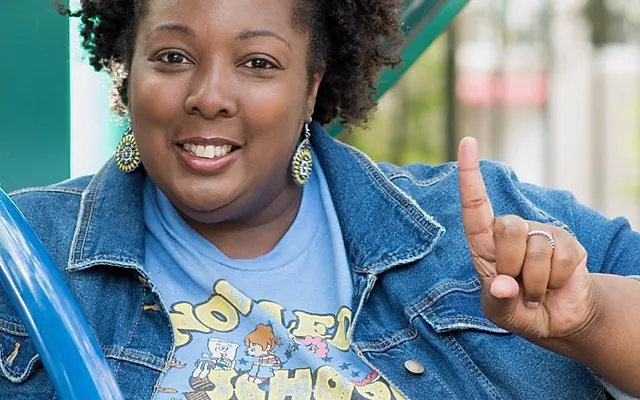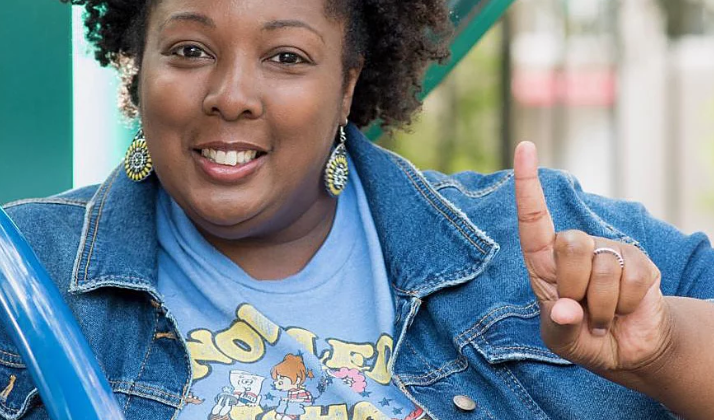Photo courtesy of bernettedawson.com.
Bernette Dawson
RF: What are your schooling and public service backgrounds?
BD: I’ve always been an advocate, from a young age. Being in the METCOprogram (busing inner-city Boston kids to the suburbs to get a better education), I was always the only minority in my class. I was very much so into the books, and just from that young age, I had to advocate for myself and for what I needed to be the best version of myself. Me going into school I have a nursing background, then I left nursing and decided to open up my own business, so I have an entrepreneur certificate from Babson, but the whole education background has come from my eldest son. When he got early intervention, not understanding what was going on, just being labeled with social-emotional needs, I had to try to figure it out. When he finally got diagnosed halfway through third grade with autism I went to the school and said, ‘okay what can we do next?’ And they said, “Ms. Dawson you’ve been advocating for your son for so long, there’s not much that we would do differently.’ I also was trained in Boston with the parent advocacy program through Boston Medical Center, and I got trained to help support parents that have children with autism so I have that formal training more in the educational system. I’m kind of like a momma bear, so it’s like everybody’s my child. Parents want to have coffee with me and just say ‘hey, what do you think about this’, so I’ve kind of been that person, and that’s why I feel like I would be a great candidate for the School Committee. I don’t just worry about my own children; I see all of them as my kids and I want everybody to have a great experience. I would love the schools to continue to find creative ways to engage the kids. I really think that we have so many great new hires with fresh ideas and even the teachers that have been here forever
RF: What distinguishes you from the other candidates?
BD: I think having two boys of color in the CPS system is what sets me apart. Test results came out the other day on how black and brown children are not doing as well. My son is high functioning autistic, and so I’ve been advocating for him since he was three, so he’s had an IEP since three years old in Cambridge Public Schools. But I think what also to just have the same stance of wanting better for our kids, so we have that in common.
RF: How does understanding the parent perspective change things for you?
BD: Especially as a parent for a child who is on an IEP (individualized education program), you have to figure things out, navigate, and learn a lot more, as opposed to a typical parent, but I do have a typical kid too, so its two different experiences that I’ve learned to understand. Having that knowledge of having current students in the system, I think, is beneficial, because then you have some equity, an investment in what would be best for the current students. Times, as we know, just as your parents and your grandparents will tell you how life was different during those times, so things evolve and change. Having kids in the current system, you see exactly what is going on from the parent side, and when I get on I can actually have both sides of the spectrum and views of things, so I believe I can make great decisions and advocate for families so we can bridge the communication with home and district.

RF: How do you think that the School Committee could become more effective?
BD: If we can start to make decisions, data is great but we have to get to a point where we may not have all of the complete data and we have to make some decisions that can actually affect the current students that are in the school system right now. If we actually try to push the policies and make some decisions with the data that we currently have in order to see if it’s working or not working, and make a decision from there, but data is only going to give you one aspect or perspective; you have to execute or start piloting things to see if they will work or not.
RF: What do you aim to do to close the achievement gap?
BD: One approach is to try to—there’s many different things that come into place when we talk about the achievement gap. We have students who leave and go to private school for a little bit and then come back in high school, so I feel like our data is not the most accurate with that. If we can at least start having families feel comfortable and trust our Cambridge public school system, from K – 12, I think we can actually have more accurate data on what really needs to be done and how to close the gap. I also think that an easy start would be to have more hearts and hands in the classroom. If the teachers have more support I think that would be great they would be able to identify students who have IEPs or those who are advanced learners or students that are just falling through the cracks. If the teachers can notice them and just pushes them a little bit they can step up their game and do great in school I think that would be one definite way of doing it.
RF: What do you see as a strength of CPS?
BD: The diversity. There are all walks of life, all different backgrounds, and I love that with CPS. One thing I can say at many different schools is that teachers care and they want the kids to strive. Another thing is there is so much opportunity. There is an abundance of resources for families and students to take advantage of. My boys take music lessons through Harmony (a program through the Phillips Brook House, providing free one-on-one music lessons), so they get to go on Harvard’s campus a lot of the time. Free and low-cost opportunities that the district provides are really great.
RF: What is a weakness of CPS you could work on to fix?
BD: Not a weakness, but I would love to see more hearts and hands in the classroom. Within the budget, I would love if we could just support our teachers because they have been asking for a long time for more hearts and hands in the classroom and more support. If we can start listening to our teachers a little bit more, seeing what their demands are and implementing them would be really great. Teachers could have time to just… take a breath. Many of our students come with social and emotional needs, which I think teachers could have a little bit more help with that too.
